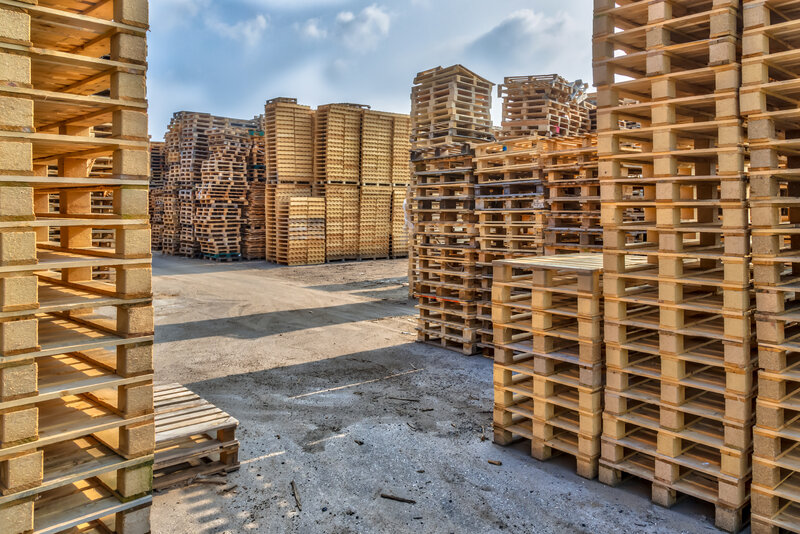The Power of Pallets

Over the years pallets have become a significant part of our global economy. Without really thinking about it pallets are a major part of our everyday lives. The furniture we have, the food we buy, has all been transported on pallets. That is unless you make your own furniture or grow your own food.
So imagine a world without pallets. The cost of canned foods would probably be significantly more just because employees would have to transport 3 to 4 cans at a time. Even orders you make online would have to be handled individually. Without pallets, the cost would be higher, labor would be increased, and products would take longer to arrive at your doorstep.
Pallets make this whole process more convenient and I mean who doesn’t want that. However, pallets were not just made convenient for the consumers or for entertainment. No, pallets were fueled by war.
Pallets Fueled By War
During WWII, the need to supply troops stationed from Europe to the pacific was indeed a challenge. The United States military had to transport everything the soldiers needed, from toilet paper to tanks, to any other necessities had to be transported over longer distances than ever before.
The U.S. military encountered obstacles along the way. Canned produce was transported overseas in the open. By the time the goods reached their destination, the goods were corroded or damaged and with a loss rate of about 40%.
In April of 1942, a large number of Filipino and U.S troops were forced to surrender due to disease and malnutrition. The supply chain had broken down, canned foods were becoming damaged or corroded once the goods arrived at their destination so the troops were left without food and other supplies they needed in order to fight.
A Navy Supply Corps officer named Norman Cahners invented the four-way pallet. This invention featured notches cut in the side of pallets so that forklifts could pick up pallets with ease and from any direction. Forklift trucks eliminated workers from lining up and loading the pallets onto the forklift.
Then came the invention of block pallets that were an improvement from the four-way pallets used during WWII. The pallet deck boards rest on sturdy blocks rather than on cross boards which make it even easier for forklift trucks and pallet jacks to lift pallets from any angle.
However, not every company uses this new approach. Block pallets cost more to build than long cross-board pallets. The use of block pallets is only used in Europe. The U.S. argues that it does not make sense for rental companies to get into that business because the supply chain between raw materials and workers takes too much time and the volumes tend to be smaller.
Pallets Fuel The World
The defeat in the Pacific made the military realize the importance of supplying the troops. The modernization of pallets started with wooden pallets and the forklift. The use of the forklift and wooden pallets was the most significant and revolutionary storage development of the war. No more damaged goods and supplies were transported with ease.
So why are pallets such a significant part of our global economy? Well for starters, pallets are efficient and:
- The perfect partner for forklifts
- Shippers can combine different products into one pallet
- Unloading pallets is a lot faster than unloading individual items
- Efficient packaging led to efficiencies on the receiving end.
Pallets were designed to work together with the forklift. The arms of a forklift can be inserted on each side of the pallets eliminating the need for workers to turn around and line them up. Forklift trucks allowed products to be moved, stacked and stored with immense speed and versatility.
Online shoppers are profitable now because they are able to combine small items into one package instead of handling each item individually. Now consumers are able to receive their items in as little as a day.
In 1931, workers took three days to unload a boxcar filled with 13,000 cases of goods. When pallets were introduced, it only took the workers 4 hours to complete.
Warehouses were able to standardize their processes for using forklifts to unload pallets and deliver them with ease to their designated areas around the warehouse.
Pallets are everywhere. As much as 80% of all U.S. commerce is transported on pallets. They are a widespread use and more than 46% are used in U.S. hardwood lumber production.
So you see, pallets have fueled not only the war but the entire world. Pallets are efficient and can greatly reduce shipping costs. Many companies like Ikea have been able to ship more supplies in a single pallet, this reduced their shipping cost by 60%.
The Future of Pallets
The future of pallets is bright just like the past and present. In fact, statistics show:
- More than two billion pallets are in circulation in the U.S.
- Approximately 94% of U.S products travel on pallets
- More than 46% of U.S. lumber production is used to build pallets
- Wooden pallets have a recycling rate of 95%, that’s more than any other packaging product.
- The production and transportation of wooden pallets make up a $31 billion industry and create 173,000 U.S. jobs.
So it’s clear that pallets won’t become extinct anytime soon. As a matter of fact, recycled pallets are actually in high demand at companies with strong sustainability programs and cost reduction strategies. Companies like the Pasadena Skid & Pallet are constantly innovating and recycling pallets every day.
Wooden pallets are sustainable over a long period of time if taken good care of. Wood is the only renewable source that we have available. Wooden pallets are eco-friendly and durable to beat loading and unloading platforms as well as transporting from one place to another with ease.
Wooden pallets use a minimal amount of energy, water, and other resources are needed to convert wood into usable wooden pallets. Moreover, wooden pallets consume low-grade lumber and trees. Pasadena Skid & Pallet can provide an SFI or FSC Certified Wooden pallets at additional charges.
Pallets are one of the best inventions of the world along with others that have fueled and grown our economy to what it is today. Pallets have sustained longevity by supplying our needs and reducing costs while also increasing efficiency. Pallets will be the main global trade in our economy for a long time.










Leave a Reply